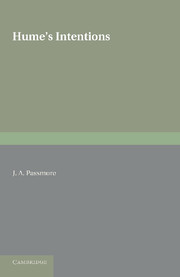Book contents
CHAPTER IV - THE POSITIVIST
Published online by Cambridge University Press: 05 June 2016
Summary
Almost alone in this respect among the great philosophers, Hume is occasionally quoted with approval by recent positivists. One passage from the Enquiry, in particular, has lent a touch of colour to innumerable positivist writings. ‘If we take in our hand any volume; of divinity or school metaphysics, for instance; let us ask, Does it contain any abstract reasoning concerning quantity or number? No. Does it contain any experimental reasoning concerning matter of fact and existence? No. Commit it then to the flames; for it can contain nothing but sophistry and illusion’ (E, 165).
This is a resounding conclusion to the Enquiry, but, like most resounding conclusions, it needs to be examined in a sceptical spirit. One must not too lightly assume that it quite accurately conveys the final outcome of Hume's reasoning. Hume is quite prepared to formulate ‘general rules’ which are neither quantitative nor experimental and to describe them, without compunction, as ‘metaphysical’. Thus he feels free to employ ‘the establish'd maxim in metaphysics, that nothing we imagine is absolutely impossible’ (T, 32), or that other maxim, which although it is ‘condemned by several metaphysicians’ is very important for his theory of perception, ‘that an object may exist and yet be nowhere’ (T, 235). No doubt, the status of such maxims is as obscure in Hume's philosophy as it is in Wittgenstein's Tractatus Logico-Philosophicus, but Hume did not conclude, in Wittgenstein's manner, that his own book was one of those which ought to be ‘cast into the flames’.
The word ‘metaphysics’ is notoriously obscure; in order to understand the nature, and the limits, of Hume's positivism we must begin by asking against what species of ‘metaphysics’ it is directed. This question is not an easy one to answer, for his usage was not consistent. Beattie was struck by the ambiguity of ‘metaphysics’ and was led to distinguish three different senses of the word. In one sense, it includes ‘all disquisitions concerning things immaterial’, so that ‘the plainest account of the faculties of the mind, and of the principles of morals and natural religion would be termed metaphysics’.
- Type
- Chapter
- Information
- Hume's Intentions , pp. 65 - 83Publisher: Cambridge University PressPrint publication year: 2013



